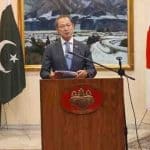ISLAMABAD, Pakistan on Friday called for joint efforts to achieve a disability inclusive health sector to envisage a world where every person enjoys the highest attainable standard of health as their fundamental right.
“COVID-19 has showed us that a lot more needs to be done to ensure that the needs and requirements of persons with disabilities are met. We can only achieve this goal if we all work together towards a disability inclusive health sector. Only by doing this, we can envisage a world where every person enjoys the highest attainable standard of health as their fundamental right,” Parliamentary Secretary for the Ministry of National Health Services, Regulation and Coordination said.
Addressing the14th session of the Conference of States Parties to the Convention on the Rights of Persons with Disabilities, co-sponsored by Pakistan and held at both in-person and virtually at the United Nations (UN) Headquarters, New York, Nosheen Hamid said COVID-19 had showed that a lot more needed to be done to ensure that the needs and requirements of persons with disabilities were met.
The theme of the session was ‘Building back better: COVID-19 response and recovery; Meeting the needs, Realizing the rights and Addressing the socio-economic impacts on persons with disabilities.’
She told the participants that during the last years, Pakistan had played a leadership role in moving the agendas of rehabilitation and improving access to assistive technology at global, regional and national levels.
Firstly, she said Pakistan had supported the WHO Rehabilitation 2030 initiative since its beginning in 2017. With the support of Member States, Pakistan also played a fundamental role in the adoption of global and regional Resolution on assistive technology.
Secondly, assistive technology has been included in Prime Minister’s national health insurance program and under this program all persons with disabilities, who are living under the poverty line are being provided with health cards for provision of medical treatment including the rehabilitation services and assistive technology, she added.
Nosheen Hamid said that in terms of improving the access to assistive technology in the country and to assess the proportion of population in need of assistive technology, Pakistan was the first country, globally, to pilot the Rapid Assistive Technology Survey.
She said Pakistan had now a National Disability and Rehabilitation Strategic Framework 2021-2026 which had integrated assistive technology as an important component of rehabilitation.
“These are just some of the actions that Pakistan has taken to advance the agenda on rehabilitation and assistive technologies. However, alongside rehabilitation and assistive technologies, there are many more components in the health sector that need to be strengthened if we want to achieve disability-inclusive health services,” she remarked.
The parliamentary secretary said the recently adopted Resolution on the highest attainable standard of health for persons with disabilities provided WHO with a great opportunity to pave the way for countries to advance their disability inclusion agenda in the health sector.
She said Pakistan was committed to work towards strengthening three basic areas of access to effective health services; protection during health emergencies; and access to public health interventions.
She said since the beginning of the COVID-19 pandemic, several actions were taken by the government. The “Pakistan preparedness and response plan COVID-19” which ran for nine months from April to December 2020 incorporated considerations for disability and persons with disabilities.
The plan was prepared with the support of the UN and was guided by the WHO Strategic Preparedness and Response Plan with an overall objective to help prevent and limit the spread of COVID-19, she added.
The parliamentary secretary told the conference that Pakistan undertook a national “Need assessment survey on COVID-19 and disability”, which was a collaborative effort between the government and WHO.
The surveys provided essential information on the challenges, barriers and impact of COVID-19 pandemic on persons with disabilities and caregivers, healthcare services, rehabilitation activities, activities of daily living (ADLs) and other activities of persons with disabilities.
In addition, information and communication materials (including awareness campaigns) on COVID-19 measures and response were made accessible to persons with disabilities.
Follow the PNI Facebook page for the latest news and updates.









